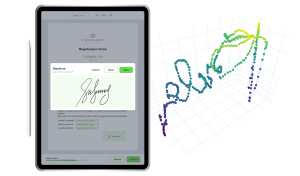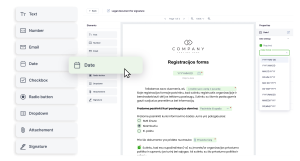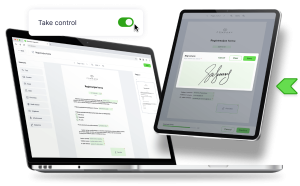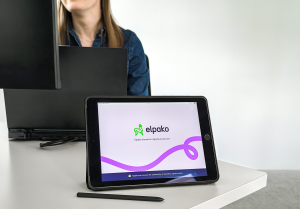Biometric signature – a digital signature for signing on a tablet
For instance, when visiting a healthcare facility, patient information is managed in digital medical records, but consent forms for surgeries or payment documents are still signed by hand. This is where the biometric signature becomes an essential technology, enabling the complete elimination of paper documents and ensuring that all processes take place in the digital space.
Use case of biometric signature
Elpako’s biometric signature is designed for in-person client services, allowing documents to be signed on tablets. This platform not only provides high legal protection but also significantly improves the quality of customer service. Clients can conveniently and quickly sign documents anywhere, whether it’s a public service center, an insurance broker’s office, or signing off on a solar power installation acceptance certificate. Using Elpako’s biometric signature, you can completely eliminate paper documents and transition to digital processes.
Features and benefits of the technology
A biometric signature is a digital method for signing documents using a tablet and its stylus. During signing, unique data from the person’s writing movements are collected, including pen tilt angles, pressure, and acceleration, which are encrypted and stored in the document. This ensures a high level of security and legal protection. Elpako’s biometric signature complies with ISO/IEC 19794-7:2021 and eIDAS regulations, guaranteeing reliability and legality throughout the European Union.
It’s important to understand that electronic signatures are often just an image of a signature, not a real electronic signature. Such an image cannot be authenticated as belonging to a specific person and holds no legal power. In contrast, Elpako’s biometric signature ensures a high level of security by collecting the person’s graphometric data during signing. In case of doubts about forgery or disputes, forensic experts can conduct a graphometric analysis to assess the validity of the signature. This signing method is legally binding and is regarded as equivalent to a handwritten signature.

More than just a signature
Elpako’s team has developed a meticulously crafted platform that not only enables the collection of biometric signatures but also ensures the highest quality of service for your clients. This solution is designed with real daily challenges in mind, offering convenient and necessary features. These help to optimize workflows, simplify document management, and enhance the customer experience at every touchpoint with the company.
Additional features
Document template creation: Elpako’s platform allows for easy and quick creation of document templates that include fillable fields with different values, which can be individually configured. These fields are inserted into the document by dragging, allowing them to be easily tailored to specific needs. This ensures that each document template can be adapted to particular cases, maximizing convenience.

Assistance features: the assistance features include the ability to work on a single document displayed on two independent screens, enabling administrators and clients to input data directly, ensuring smooth and efficient collaboration. The document completion process is accompanied by a wizard animation that helps clients understand the steps and ensures seamless information entry. These features ensure that clients are always informed about each step and can easily fill out documents.

Compatibility with all tablets: Elpako’s biometric signature platform works on any tablet with a digital pen, as well as on smartphones, requiring only an internet connection. The platform supports Android, Windows, iOS, and Linux operating systems, making it compatible with a variety of devices regardless of manufacturer or technical specifications. Additionally, there is an option to customize the tablet’s screen background to match the organization’s visual style, ensuring a professional and appealing service center image at every customer service step.

Document storage: the generated document is stored in Elpako’s data repository, ensuring secure and reliable document storage. Using artificial intelligence (AI), you can easily perform data searches and integrate storage solutions with popular tools like Google Drive, Dropbox, SharePoint, and other systems. This feature allows you to have all necessary documents in one place and access them quickly at any time.
API integrations: Elpako offers extensive integration capabilities with other systems through an API interface, allowing efficient transfer of documents and data. You can easily integrate Elpako’s biometric signature solution with existing platforms and tools, such as various CRM systems, document management, or other specialized platforms. The integration capabilities provide flexibility and efficiency, enabling you to optimize workflows and increase operational performance.
Elpako’s biometric signature platform offers a wide range of additional features, including:
- Different signing methods: options to sign with a pen, finger, or computer mouse, as well as using various specialized signing devices.
- Support for multiple signatures: multiple signatures on a single document, including qualified, advanced, and biometric signatures.
- User and role management: ability to assign different rights and functions to various users.
- Signing session monitoring and review: allows tracking of signing processes in real time.
- Document archiving: secure and convenient document archiving.
- Document attachments: ability for clients to add photos or additional documents directly.
- Form selection: clients can conveniently select the desired service or document directly from the stand-by window on the tablet.
- PDF editing: automatic recognition and editing of fillable fields in Adobe PDFs.
- Digital signature and timestamping: ensures document authenticity and immutability.
- Geographic location tagging: enhances signing security by specifying the geographic location.
- Audit records and reports: comprehensive audit records and reports, ensuring compliance and transparency.
- Platform customization: customization of design and font according to organizational styles, and multi-language support.
- Accessibility for people with disabilities: ensures that the platform is accessible to all users.
- Other biometric integrations: includes integrations for other biometric features, such as voice or fingerprints.
Elpako’s biometric signature is an innovative solution that helps organizations step further into the digital era. By providing high security and efficient document management, this solution not only helps reduce costs but also improves the quality of customer service. Integration with various systems and wide application possibilities make Elpako’s biometric signature an ideal choice for any organization looking to digitize its operations.
Try the demo version
If you want to learn more about Elpako’s biometric signature platform, our expert Rokas will not only answer all your questions but also introduce you to the platform’s capabilities and provide detailed information about pricing.
Additionally, we offer a 7-day free demo period for you to try Elpako’s biometric signature platform. This is a great opportunity to see how the platform works in real conditions and how it can improve work processes and customer experience.
To get in touch and register for the demo version, contact the Business Development Manager, Rokas Jašinskas, at +370 620 54 160 or email at [email protected]
eIDAS Regulation: what is important to know?
Electronic signatures – a means of identifying natural persons
The possibility for natural persons to sign with an electronic signature is one of the biggest changes in the provision of trust services that has been implemented with the adoption of the eIDAS Regulation. Until then, e-signatures were also used as a means of identifying legal persons under the Directive on a Community framework for electronic signatures. Since the eIDAS Regulation came into force, legal persons are not issued electronic signature certificates, but electronic seal certificates, which are not intended for signing but for ensuring the origin and integrity of data.

What additional trust services are defined in the eIDAS Regulation?
Electronic seals
As we have already mentioned, electronic seals are not equivalent to electronic signatures confirming the identity of a legal person. It is a tool to ensure the origin and integrity of documents or data. However, if you decide to start using an electronic seal, it is essential to ensure that it is only available to those persons who are authorised to act on behalf of a particular legal entity. This is usually the head of the company or his/her authorised persons.
Electronic timestamps
Electronic timestamps are used to ensure the correctness of the time associated with a particular document or data.
Verification and validation service
In order to validate a qualified electronic signature or electronic seal, it must be verified that it meets all the requirements listed in the Regulation. This is one of our services that is relevant to natural and legal persons.

What are advanced and qualified electronic signatures?
The eIDAS Regulation defines an electronic signature as data in electronic form, logically associated with other electronic data, used by a person for signing purposes. In practical terms, the signature on the courier’s tablet, for example, which is affixed when a person collects a parcel addressed to him or her, also fits the definition of this concept. Obviously, this method of signing would create a number of problems if the identity of the signatory had to be proven.
It is for this reason that the eIDAS Regulation also defines advanced and qualified signatures that provide a higher level of security which fulfil all the requirements set out in the Regulation. Advanced electronic signature is an electronic signature which, in accordance with the requirements approved in Article 26 of the eIDAS Regulation:
- it is uniquely linked to the signatory;
- it is capable of identifying the signatory;
- it is created using electronic signature creation data/information that the signatory can maintain under his sole control;
- it is linked to the signed documents in such a manner that any subsequent change of the data is detectable.
A qualified electronic signature is essentially the same as an advanced electronic signature, however, in order to meet even higher security requirements, it is created using a qualified signature creation device (i.e., configured software) and validated by a qualified electronic signature certificate, which can only be issued by a qualified trust service provider (TSP).
The eIDAS Regulation does not oblige parties to use a specific type of electronic signature (smart or electronic), thus allowing individual discretion. Although the most widely used in Lithuania are qualified e-signatures that ensure the highest level of security (Mobile-ID (mobile signature), Smart-ID app, ID card), advanced e-signatures are also used in certain cases. One of its applications is the signing of internal and short-term corporate documents. The institutions that decide to use advanced electronic signatures are responsible for their reliability and suitability.
Do electronic documents have legal standing?
Probably one of the main issues, or even fears, that hinders the transition from the era of paper documents and handwritten signatures to a more modern, convenient and efficient world where documents are signed at the click of a button, is the uncertainty of whether electronic documents have the force of law? The eIDAS Regulation makes it clear that electronic documents signed with an electronic signature or authenticated by an electronic seal and/or an electronic timestamp are subject to the principle of non-discrimination and admissibility in legal proceedings in any EU country.

NEVDA UAB is now part of the trusted lists defined by the eIDAS Regulation
In accordance with the eIDAS Regulation, trusted lists are lists established, maintained and published by each Member State, which include qualified trust service providers.
On 30 June 2022, the Communications Regulatory Authority of the Republic of Lithuania (CRA) has adopted a resolution granting our company, i.e., NEVDA UAB, a qualified status from 1 July 2022 allowing it to provide qualified electronic signatures and validation of validity of qualified electronic seals, which are becoming increasingly more popular among both private and legal entities.
This decision was taken by the CRA after objectively assessing that qualified trust services we plan to provide fully comply not only with the already discussed eIDAS Regulation but also the Law of the Republic of Lithuania on Electronic Identification and Trust Services for Electronic Transactions, as well as the requirements of the legal acts for implementing it.
Thus, since the adoption of the above mentioned CRA resolution, we are only the second service provider of this type to be included in the trusted list set forth in Article 22(1) of the eIDAS Regulation.
We can provide more information about eIDAS and how it applies to work processes privately: contact details